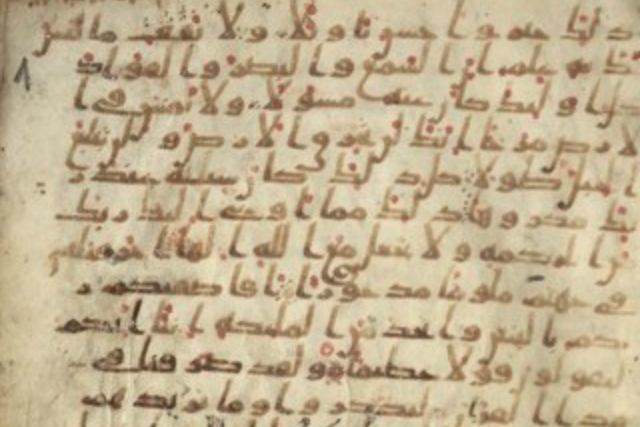
Researchers from the Project Coranica at the University Library in Tübingen, Germany have discovered a copy of the Quran that may be the oldest in the world, dating to within 20-40 years of the death of Islam’s Prophet Muhammad. The copy of the Quran, dubbed Ma VI 165 by scientists, appears in the famous “Kufic script,” popularized by Imam Ali ibn Abu Talib who moved the centre of the Islamic government to Kufah in the after being elected as “Caliph” in 656 AD. The manuscript “with a 95.4% statistical probability can be dated to the period between Ad 649 -675,” according to Medieval Histories Magazine.
The timeline for when the manuscript was created, coupled with the fact that Imam Ali was one of the few early Muslims that was literate, lends strongly to the notion that this manuscript is linked to the Imam. The theory is bolstered by the fact that of the first several Muslim leaders after the death of Prophet Muhammad, Imam Ali was the only one who had memorized the Quran in its entirety and became a “hafidh.”
That the manuscript is on a high quality parchment that has survived for more than 1,339 years – with minimal preservation methods employed, further indicates that the document was created for official purposes, perhaps in relation to the work of Imam Ali’s Islamic government.
Imam Ali is viewed by Shiite Muslims as the true successor to Prophet Muhammad, and the first in a line of holy leaders tasked with bringing justice to the world. For Sunni Muslims, Imam Ali is revered as the fourth and final “righteous” Caliph.
The manuscript will be on display in Germany, as the University Library states “This coming autumn one of the parchment fragments will be on view to the public in Antwerp in the exhibition ‘Holy Scriptures – Holy Places. Judaism, Christianity, Islam,’ in the Hendrik Conscience Heritage Library. This will be a perfect opportunity to bring these new findings to the attention of a wider audience.”
According to university representative Dr. Eva Mira Youssef-Grob, “The Coranica project includes a module named computatio radiocarbonica where palaeographical analysis and dating of the oldest manuscripts of the Quran will be supplemented by scientific methods such as radiocarbon dating…
“The results for manuscripts dated by colophon and their C14-age will be set in relation to the measured values of undated pieces…
“With this research, the actual precision and significance of C14 datings can be determined for early manuscripts of the Quran. The selection forms a representative sample from the known manuscripts in hijazi ductus, which are considered the oldest written textual witnesses of the Qur’an – their temporal proximity to the proclamation of Muhammad is still discussed today.”
The MA VI 165 manuscript appears to contain a large section of the Quran, from Chapter 17, verse 37 to Chapter 36, verse 57. Interestingly, the first verse of the manuscript seems to poetically foretell the preservation of the document. The first part of the verse is translated as “Nor walk on the earth with insolence: for thou canst not tear the earth apart…”
The entire manuscript can be viewed here. Up until today, the famous Sana’a manuscript has been viewed as the oldest manuscript, dating back to almost exactly 671 AD. The MA VI 165 script cannot be narrowed down further than betwee 649 AD to 675 AD, so now both documents are tied for the “oldest copy” record.
The MA VI 165 script is viewed as a “very early Quran” because it is written in something called the “Hijazi” variant, a type of Arabic writing that is sloped and has a distinctive style. Quranic manuscripts that utilize the Hijazi variant typically draw immediate attention from researchers, as the script is only used in very early Quran manuscripts.
Imam Ali has gained great attention this year, having been quoted by notable celebrities and politicians. In the most recent instance, NFL player Pierre Garcon posted a famous saying of Imam Ali on social media.
R111/112/C